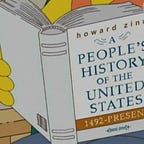Heart of Darkness by Joseph Conrad
I don’t really talk much about the fiction I read, it’s interesting to hear everyone’s interpretations of great literature of course, but when I write about it I tend to give away spoilers. Like when I told someone about the end of the Titanic and completely ruined the film for them! Speaking of boats (*spoiler* The Titanic was a boat), this book has a boat in it and it is a classic read that made me ponder all sorts from the past and present, as well as other books I have read! A key theme of the book is the colonial legacy of Europe and it acts as a lesson on the time of the “Congo Free State” and the exploitation of the natives as part of the ivory trade, whilst also giving the opportunity to reflect on the world today and how the tensions that developed then have perpetuated an unequal world which requires resistance to gain independence. The book doesn’t go as far as stating that natives need freedom and there is a general sense that the oppressors firmly believe they were superior to those they colonised. This view emanated outwards from the true “Hear of Darkness” aka London, towards the perceived heart of darkness (in this case the Congo).
Throughout the book, there is clear anxiety about the cruel practices in place and the characters do seem to grapple with the cruelties of imperialism a lot. Maslow seems self-conscious, yet totally blinkered regarding alternatives that would not require oppression and exploitation. Colonialism was seen as a way of life, Conrad couldn’t or wouldn’t articulate an alternative probably because the only real alternative is an independent Africa which would totally flip the dynamic of the world on its head. The pages were littered with moral ambiguity as it highlights the hypocrisy of colonialism as European “civilisation” condemns the savagery of nations they rob and subjugate. As I see it, the “darkness” is found anywhere the ground has been seized by imperialism and efforts of decolonisation are what bring the light. The colonisation of the Congo on display in this book is portrayed as unavoidable and the main character submits to authority or tries to distance himself from the most brutal actions of others to feel better about his place in the world. “No man here bears a charmed life” is a bizarre thing to say when you and your associates are the ones responsible for the awfulness. A charmed life would come much easier if you cared for people over profit and worked with other countries rather than pillaging them!
A writer is unlikely to side with those without a voice, history is often written by the victors. Though it seems that Conrad saw himself in the oppressed and he had also travelled through the Congo Free State when it was under King Leopold of Belgium’s rule, seeing the atrocities for himself. This book was somewhat based on that voyage and that does add to the authenticity of the actions described within. On his own journey down the Congo river, Maslow seems to be wrestling with his conscience as he works out what he thinks of what surrounds him. Traversing a jungle in his own mind, which can be a slow and painful process that may not get you very far. I think I’ll try and read more fiction going forward, it can make you think about what it means to be human through someone else’s lens in a way that differs from non-fiction writing.
